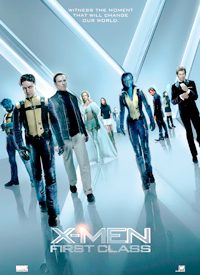
The fifth installment of the X-Men film series is set in the 1960s where it regales audiences of the origin of mutants, using the backdrop of the Cold War to reveal how past history often informs the present.
It begins in the same way as the last X-Men film, in a Nazi concentration camp in the 1940s, where a young Erik Lensherr destroys a gate that separates him from his parents with his mind. It is a maneuver that provokes the attention of Dr. Schmidt, later known as Sebastian Shaw, who attempts to use Erik for his powers, but is rejected, and lays the groundwork for a fierce rivalry between the two throughout the film.
The plot progresses from World War II to the Cold War, as Erik takes on another nemesis, Charles Xavier (James McAvoy), who has been employed by the CIA to stop violent mutants who seek to bring about war, and ultimately leads to the creation of the X-Men.
Both Erik and Charles seek to stop Shaw before he successfully engulfs the world in nuclear war, but their motivations could not be more different. Charles’ intent is to help save humanity, thereby proving to the world that it should accept mutants, while Erik is driven by his thirst for vengeance. He clearly indicates that he does not intend to stop Shaw, but to kill him.
Erik believes Charles’ hopes for a harmonious world where mutants and humans can co-exist is naive, and Erik’s staunch cynicism transforms him into Magneto. The film seemingly takes a very sympathetic approach to Erik’s mentality, juxtaposing his struggle for equality against the real-life struggles in the United States, including that of homosexuals, a subtle point made in the film.
The dichotomy created by Erik and Charles makes for an interesting element in the plot, and as the film is placed in a historical time frame, including that of the Civil Rights movement, one cannot help but draw similarities between the dichotomy of these two characters, and that of Martin Luther King, Jr. and Malcolm X.
X-Men First Class seems to be telling too many different stories at one time, both historical and personal, and ultimately fails in the process as the plot becomes far too complicated.
Perhaps sensing some of the gaping flaws found throughout, the film heavily relies on violence and special effects to refocus audience attention, but goes a bit too far in the process. For example, the young Erik is forced to watch as his mother is violently murdered by Nazi mutant Dr. Schmidt. At one point, a man rips out the metal filling from another man’s tooth, while two men have their heads crushed through the power of a young man’s mind. The violence is virtually unending, with continuous explosions and combat.
In addition to the violent nature of the film, sexual innuendo is quite apparent as well, with seductive scenes, sexual language, and promiscuous attire.
Some may be angered by the film’s treatment of the Cuban Missile Crisis, as it places much of the blame on the United States, asserting it provoked the crisis. While the film pretends that both sides of the crisis were actually being manipulated by Nazi mutants, the underlying message still prevails.
The film does not shy away from references to Darwin, as mutation is a key to Darwin’s theory of evolution, and the film asserts that mutantkind is the next stage of the evolutionary process for humans. In fact, one minor character in the film is nicknamed Darwin.
Overall, X-Men First Class proves yet again that there is very little media wherein a blatant agenda cannot be found. If special effects, indoctrination, and gut-wrenching violence is not your forte, it may be in your best-interest to avoid X-Men First Class.




